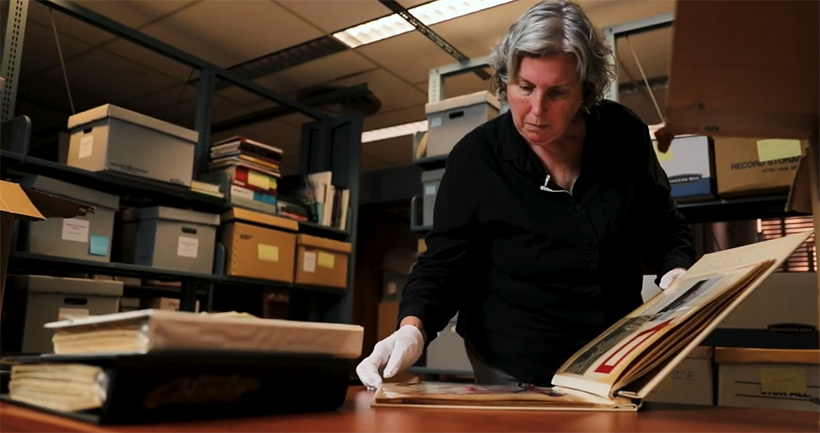Introducing Cougar Collections
UH Libraries is pleased to introduce Cougar Collections, a new video series featuring the rare and unique research collections you can find at UH Special Collections.
In the inaugural episode, Processing Archivist Kevin Kinney shares a few compelling themes of the Red Adair Collection.

The Red Adair Collection is the first to be featured in UH Libraries’ new series, Cougar Collections.
Special collections and archives contain primary source materials, the ingredients of original scholarship. The new Cougar Collections series brings archives alive, surfacing the stories and voices that illuminate our history and inform our future.
Watch Cougar Collections: Red Adair.
Learn more about visiting Special Collections.
Access digitized materials at UH Digital Collections and the Audio/Video Repository.
Media Mentions: Tommy Tune Collection

Tommy Tune’s portrait from William Morris Agency
The announcement of the Tommy Tune Collection acquisition at University of Houston Libraries has garnered strong media coverage. Materials documenting the life and career of the prolific dancer/singer/director/choreographer are currently being processed, and will be accessible for research at a future date.
Thomas James Tune was born in Wichita Falls and grew up in Houston where he attended Lamar High School. After graduating from University of Texas at Austin, the 6 foot 6 tap dancer began graduate studies in directing at University of Houston, but soon left Texas for New York City, where his career launched from day one. In 1965, Tune made his Broadway debut in the production of Baker Street, followed by A Joyful Noise (1966) and How Now, Dow Jones (1967).

Assistant university archivist Katy Allred carefully checks each item of the Tommy Tune collection to ensure proper preservation.
The acquisition was facilitated by Mary Manning, university archivist, together with Christian Kelleher, head of UH Special Collections. Manning sees a host of opportunities for how the Tommy Tune Collection can advance academic and scholarly productivity. “The Tommy Tune Collection is a significant contribution to the study of theatre history, particularly musical theatre,” she said. “Tommy Tune is not only a talented singer, actor, and dancer, but also a celebrated director, producer, and choreographer; his archives will be enlightening to scholars and performers researching any of these fields. The collection will provide insight into Tune’s creative processes and provide cultural context for the plays he directed and performed in; it can serve as a source for reconstructing the plays and performances, inspiring and providing material for musical theatre students and professionals.”
“Broadway legend donates personal collection to University of Houston” – Houston Chronicle, January 8
“Tommy Tune Collection Finds a Home at the University of Houston” – Broadway World, January 8
“Tommy Tune’s Archives Will Be Housed at the University of Houston” – Playbill, January 8
“Broadway legend Tommy Tune donates his costumes, scripts, letters to University of Houston” – Houston Public Media, January 9
“Houston-born Broadway legend donates 50,000 item personal collection to UH” – CultureMap Houston, January 9
Hello Houston – Houston Public Media, January 22
“Tommy Tune’s personal archive at the University of Houston” – ABC13 Houston Localish, February 2
On Display: Go, Coogs, Go
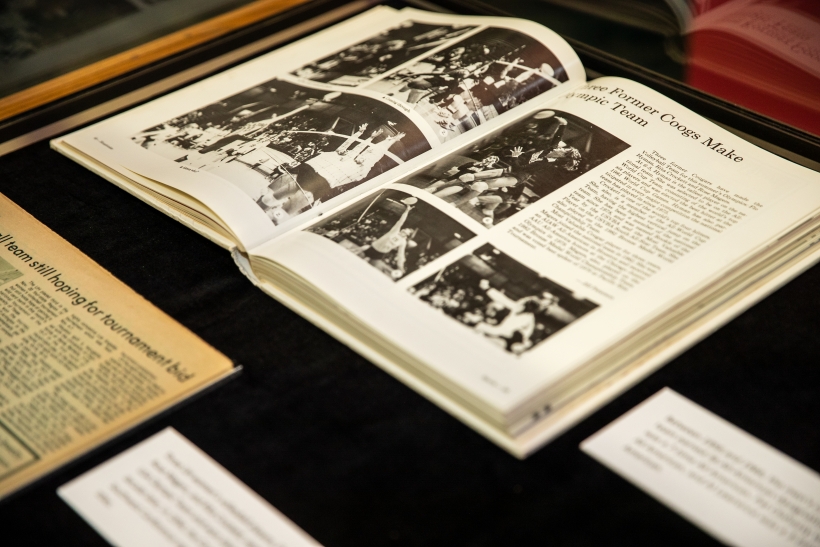
Go, Coogs, Go: A Celebration of UH Fall Sports
Video: Ask an Archivist
For #AskAnArchivist Day and American Archives Month, we asked three UH archivists to share a bit about their work. In this video, Katy Allred, assistant university archivist for the Centennial project; Vince Lee, archivist for the Carey Shuart Women’s Research Collection; and Mary Manning, University of Houston archivist, talk about how they got into the field of archives, what a typical workday looks like, and some of their current projects.
UH Libraries Announces the Suzanne Paul Collection
UH Libraries thanks Deborah Colton for her contributions to this announcement.
University of Houston Libraries Special Collections is pleased to announce the donation of the Suzanne Paul Collection.
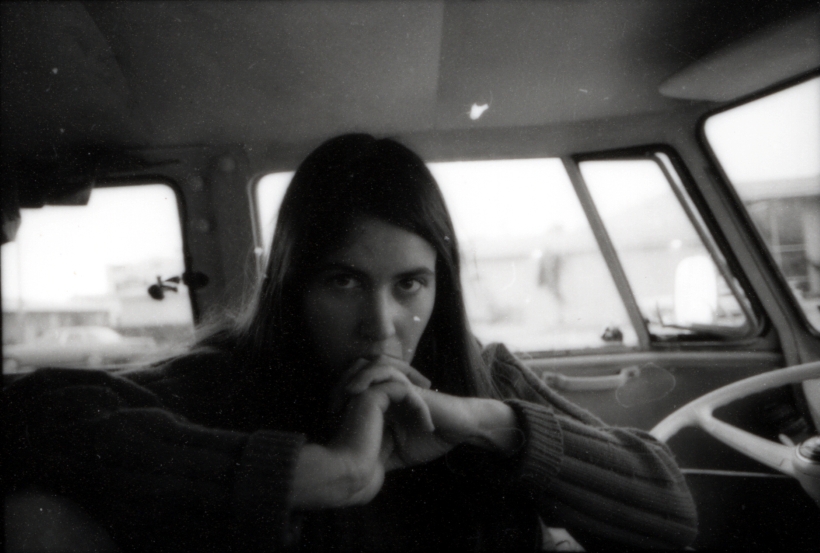
Image of the photographer Suzanne Paul, circa 1970s, sourced from a contact sheet
Suzanne Paul (1945 – 2005), a native Houstonian and pioneering female photographer, has made a vast contribution to representing the arts of Houston and to recording Houston’s art history. Through pure creative impetus and respect for the arts in the city, Suzanne photographed the heartbeat of Houston’s art scene from the mid-1970’s through the beginning of the millennium. This collection has now been generously donated by Suzanne’s daughter, Mercedes Mallard Paul.
Paul’s introduction to the arts of Houston started in 1976 when James Harithas, who was then the Director of the Contemporary Arts Museum (CAMH) commissioned her to take photographs of artists and their art installations at the museum. Shortly thereafter, she was offered the first solo exhibition of a female artist there, which featured her photographs. Suzanne was always at every art happening that was significant in the city, carefully taking photos and capturing the essence and soul of each event.
In revealing ways, Suzanne Paul has documented the artists, the curators, the gallery owners and patrons of that era. The people who shaped and defined Houston’s rapid growth and helped the arts flourish, which set the stage for who we have become as a vibrant art city today.
Among the first artists Paul photographed were Dick Wray, Julian Schnabel, Terry Allen and Norman Bluhm. Soon after, she documented Richard Stout, Bert L. Long Jr., Jesse Lott, The Art Guys, Mel Chin and Edward Albee. In addition to her portraitures of artists and long-time friends, Paul captured photographs of museum curators like Anne Tucker, Walter Hopps, Alison de Lima Green and Edward Mayo, and patrons starting art nonprofits at the time, like Ann Harithas, Marilyn Oshman and others. So many art celebrities and patrons on this era were photographed through Paul’s skillful lens. Without Suzanne Paul’s photographic documentation of this incredible growth era of the arts in Houston, so much of this period would be lost.
This collection of photographic negative, slides, prints and related memorabilia from this work was left in the care of Deborah Colton – Deborah Colton Gallery since the artist’s passing in 2005. At the request of Suzanne’s daughter, Deborah Colton Gallery hosted the Memorial Reception and Exhibition of Suzanne and her work in March of 2005, which was the time of her passing. This important exhibition was at Colton’s gallery at 2500 Summer Street at the time, where hundreds of people from the art community came to pay their respects to this notable artist.
Deborah Colton Gallery, in collaboration with Suzanne’s daughter Mercedes Mallard Paul, worked tirelessly for many years to catalog and preserve Paul’s imagery and related materials, including prints, negatives, slides, press articles, catalogs, and letters. The result is an impactful, tangible record affirming Paul’s distinction and major contribution to Houston’s arts and culture.
As Deborah Colton stated, “I dedicated so much of my staff’s and my time and financial resources to the Suzanne Paul project and protected this Collection for close to two decades. I did this with conviction and long-term dedication because I knew how important it was to Houston’s art history. During the time Suzanne was photographing, she was known to be at anything and everything important in the arts happening in the city. She was the first and the last to put so much of her heart and soul into the documentation of the city’s arts, and such an important time it was: a rapid period of growth, helping shape our arts and culture into the vibrant community that it is today. It has been my long-term goal to see this collection be placed with the Special Collections of the University of Houston Libraries.”
“I believe my mother wanted to capture the art world in Houston because that was her passion,” Mercedes said. “Art and photography were things that she lived and breathed daily.”
Christian Kelleher, current director of exhibitions and external relations and former head of Special Collections, said “the work of Suzanne Paul will prove to be invaluable for research in the arts, women’s history and the history of Houston. This is a special, influential legacy that we are honored to preserve in our collections.”
The Suzanne Paul Collection is a compelling addition to an already rich archive of primary source materials in performing and visual arts. Through UH Special Collections, UH students and faculty, as well as global scholars, can explore records of well-known regional organizations that document theater companies, directors, producers, performers and artists, and art groups.
“Suzanne Paul’s work captures the soul of Houston’s art scene with striking clarity and depth,” said Lauren Gottlieb-Miller, associate dean for Special Libraries and Preservation. “This collection not only preserves her legacy but enriches UH Libraries’ commitment to documenting the city’s cultural history. We are deeply grateful for the dedication of Deborah Colton Gallery and Mercedes Mallard Paul in bringing this invaluable archive to our students, scholars, and community.”
The collection is currently being processed. For information, contact Christian Kelleher.
New Exhibit on the Black Arts Movement Opens at UH Libraries
Recently, University of Houston Libraries hosted an opening reception for the new exhibit “Black Ink: The Black Arts Movement in Print.” Rare Books curator Julie Grob selected materials from UH Special Collections’ significant holdings of poetry and other writing published during the Black Arts Movement period of the 1960s and 70s. A few of the writers featured are Amiri Baraka, Toni Cade Bambara, Gwendolyn Brooks, Nikki Giovanni, and Ntozake Shange. The exhibit also includes examples from the Black-owned publishers Broadside Press of Detroit and the Third World Press of Chicago.
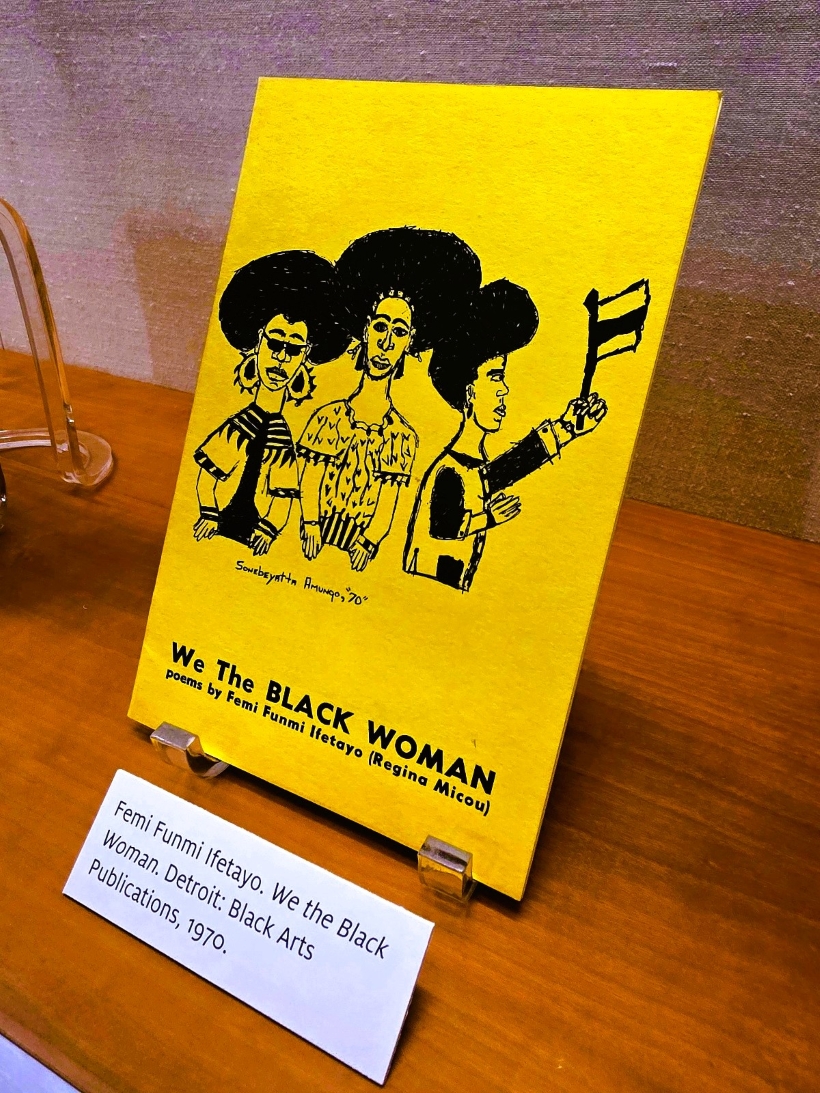
The community engagement event held at the Elizabeth D. Rockwell Pavilion included poetry readings from three graduate students in the UH Creative Writing Program. Abby Mengesha, Anthony Sutton, and El Williams III shared poetry from writers of the Black Arts Movement along with their own works.
Sutton wrote the following introduction to the exhibit:
This mid-twentieth century movement in literature, music, and art coincided with cultural shifts in the post-World War Two United States, including the Civil Rights movement and the Cold War. Through the Black Arts Movement, experimental literary sensibilities emerging at the time met the politics of the Black Panthers.
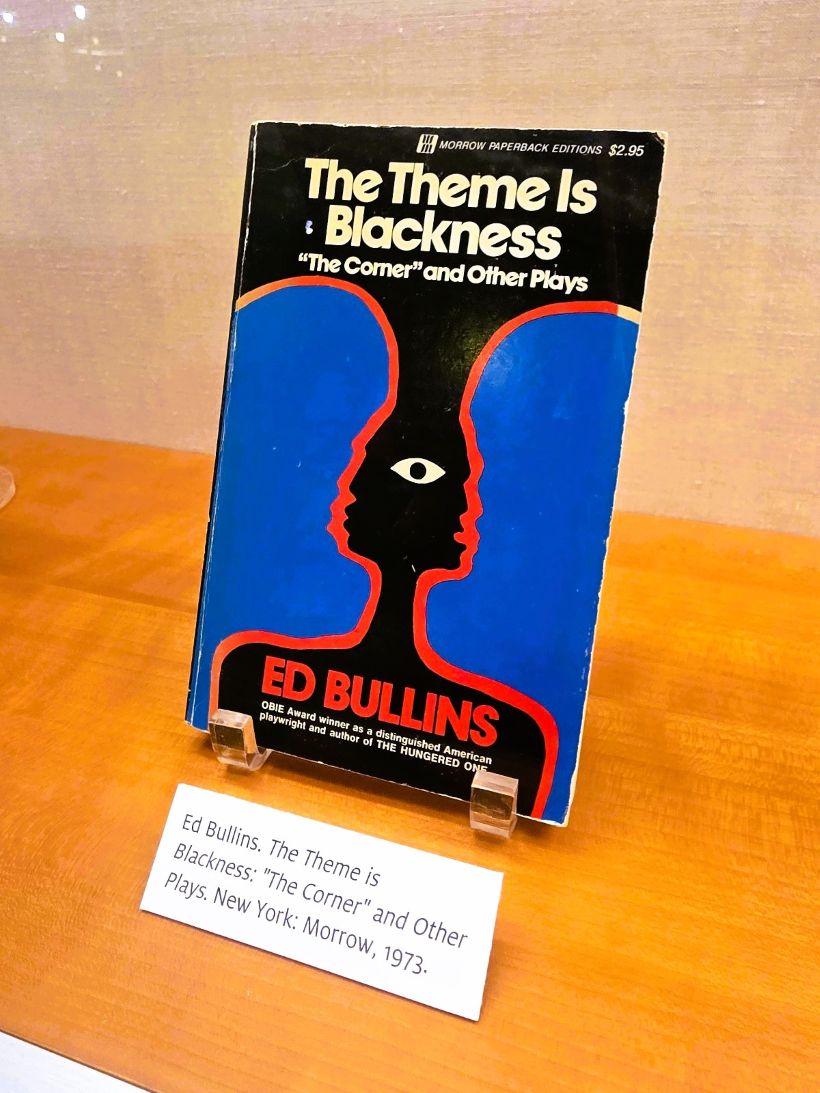
While some members of this grouping, such as Lorraine Hansberry, Amiri Baraka, and Gwendolyn Brooks, achieved mainstream recognition, this movement largely made use of underground and alternative venues such as the Black Arts Repertory Theater and School in Harlem for works to be performed. Print materials from the Black Arts Movement show the DIY publishing possible with a machine called the mimeograph which allowed the production of large volumes of magazines and books quickly and affordably.
The Black Arts Movement was also a nation-wide movement with not only New York City being a hotspot but also significant publishing activity in the Midwest with Broadside Press in Detroit and Third World Press in Chicago. In 2025 Third World Press received the Toni Morrison Achievement Award from the National Book Critics Circle. The Black Arts Movement eventually reached Houston through Lorenzo Thomas who served as Writer-in-Residence at Texas Southern University and later as faculty at UH-Downtown.
Visitors are invited to experience the exhibit, located at MD Anderson Library floor 2, through May 2026.
New Processing Archivist
University of Houston Libraries is pleased to welcome Kevin Kinney as the new processing archivist.
Please describe your role. How does your work align with the student success and research productivity focus of the University?
I will be working with Special Collections to arrange and describe archival materials across a wide array of subjects and formats, making them available for students, faculty, staff, and the broader public to access and research. The subjects those materials cover range from Houston hip-hop and rare books to women’s studies and LGBT history, among many other topics. Doing this will help students to engage with primary source materials, conduct research with collections spanning multiple disciplines, and learn how information has been recorded and disseminated across centuries.
Please share a bit about your background and professional interests. How do these inspire and shape your approach to archival processing?
As someone who has always enjoyed being in the presence of books and “old stuff,” working in libraries and archives was pretty much inevitable. The bulk of my work experience has been in academic and public libraries, starting with paging maps and atlases as a freshman at the University of Michigan, where I received both my Bachelor of Arts in Psychology and Master of Science in Information. It was also at U-M where I first gained experience working with special collections. I further developed that experience working as an archivist at Rosenberg Library in Galveston, Texas, for over eight years. Rosenberg’s archival collections touched on almost all of my personal and professional interests, including maritime history, historically underrepresented communities, church history, rare books, and genealogy.
Since Rosenberg is a public library, working there gave me a sense of urgency in learning how best to make information accessible and easy for the public to understand, especially during a time when information access and literacy are needed now more than perhaps ever before. When I process a collection, regardless of its topic, I think about how I can arrange and describe it such that anyone, especially someone who has never heard of an archive, can understand and use it.
What are one or two things you’d like faculty, students, and scholars to know about the function/purpose/significance of archives?
Archives are a concrete example of physical/digital presence and enduring relevance, whether they document an individual’s activities during a particular window of time, an organization’s operations across decades, or even a country’s history of accomplishments and failings since its founding. Archives, more specifically access to and the use of archives, help to strengthen collective memory of the past, place present events in their full context, and predict future developments with high accuracy and confidence. Archives are of immense value to everyone on and off a university campus.
Announcing the Tommy Tune Collection at UH Libraries
What didn’t tall Texan Tommy Tune accomplish in the performing and visual arts world?
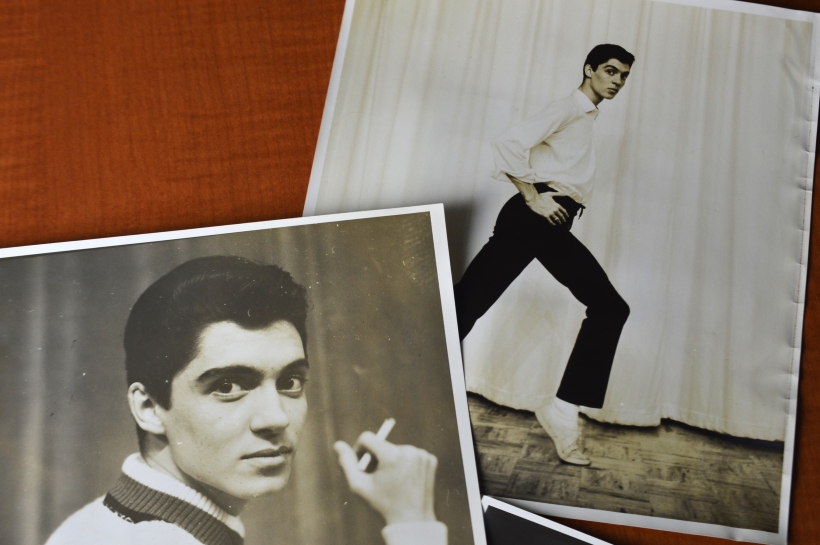
The Tommy Tune Collection at UH Libraries
Students and scholars will be able to explore that question and much more with the acquisition of a wonderful new collection at University of Houston Libraries that preserves and celebrates the legacy of the prolific dancer/singer/director/choreographer.
Thomas James Tune was born in Wichita Falls and grew up in Houston where he attended Lamar High School. After graduating from University of Texas at Austin, the 6 foot 6 tap dancer began graduate studies in directing at University of Houston, but soon left Texas for New York City, where his career launched from day one. In 1965, Tune made his Broadway debut in the production of Baker Street, followed by A Joyful Noise (1966) and How Now, Dow Jones (1967).
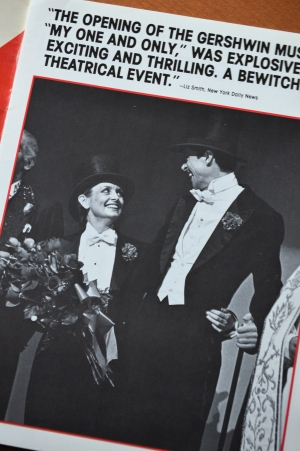
Tune is the recipient of 10 Tony Awards, including the 2015 Tony for Life Achievement in the Theatre. He is the only star in theatrical history to win in four categories, and the only person to win the same Tony Awards two years in a row. Tune also received The National Medal of Arts, the highest honor for artistic achievement given by the president of the United States. He was honored with a star on the Hollywood Walk of Fame in 1993.
And those accolades only scratch the surface. Tune’s illustrious performing arts career comes alive in the massive collection, which currently boasts nearly 100 linear feet of materials, and will grow even more with a forthcoming second shipment from New York City.
Tommy Tune and his sister, Gracey Tune, generously gifted the first set of items to University of Houston. Gracey Tune is the founder and artistic director of Arts Fifth Avenue in Fort Worth, where much of the collection was housed.
“The Tune family is so thankful and thrilled to have the Tommy Tune Collection at University of Houston,” said Gracey Tune. “We appreciate each individual embracing this big project. It began when we contacted Hillary Hart at TUTS; she was excited and contacted Mary Manning…the rest is history. We are Houstonians – we love Houston and UH.”
The acquisition was facilitated by Mary Manning, university archivist, together with Christian Kelleher, head of UH Special Collections. Manning sees a host of opportunities for how the Tommy Tune Collection can advance academic and scholarly productivity. “The Tommy Tune Collection is a significant contribution to the study of theatre history, particularly musical theatre,” she said. “Tommy Tune is not only a talented singer, actor, and dancer, but also a celebrated director, producer, and choreographer; his archives will be enlightening to scholars and performers researching any of these fields. The collection will provide insight into Tune’s creative processes and provide cultural context for the plays he directed and performed in; it can serve as a source for reconstructing the plays and performances, inspiring and providing material for musical theatre students and professionals.”
Bit by meticulous bit, Katy Allred, assistant university archivist, will survey each item in the collection, which includes costumes, scripts, production and publicity photos, newspaper articles, posters, paintings, scrapbooks, correspondence, sheet music, playbills, drawings, souvenir books, production documents, and awards and honors.
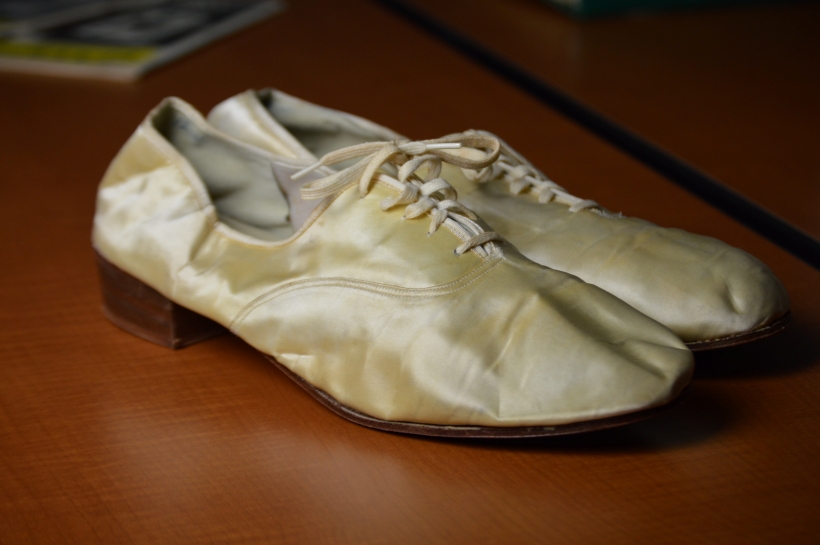
Archival materials often arrive at UH Special Collections (located on MD Anderson Library floor 2) in containers such as plastic tubs or cardboard boxes. Items might have binders, such as rubber bands that can harden and stick, or fasteners that can rust. Part of the job of an archivist like Allred is to go through the entire collection, identify preservation concerns, and intervene. This process will bring to light the condition of each item, which will inform preservation in archival enclosures, such as how to store Tune’s dazzling sartorial pieces. “This collection is really interesting because it comes with a lot of textiles,” Allred noted. “We don’t usually get collections with a lot of costumes. The challenge of preserving hats, shoes, and coats will be a new thing to learn.”
Allred will gain a sense of how to arrange the collection into series for the finding aid that will be published online. The finding aid is a tool researchers can use to browse collections, identify the boxes they’d like to explore, and contact UH Special Collections with their request. The collection will be of particular interest to UH students, faculty, and researchers seeking primary source materials on Tommy Tune’s life and career, including documentary filmmakers, biographers, dance historians, musical theatre performers, directors, producers, and choreographers.
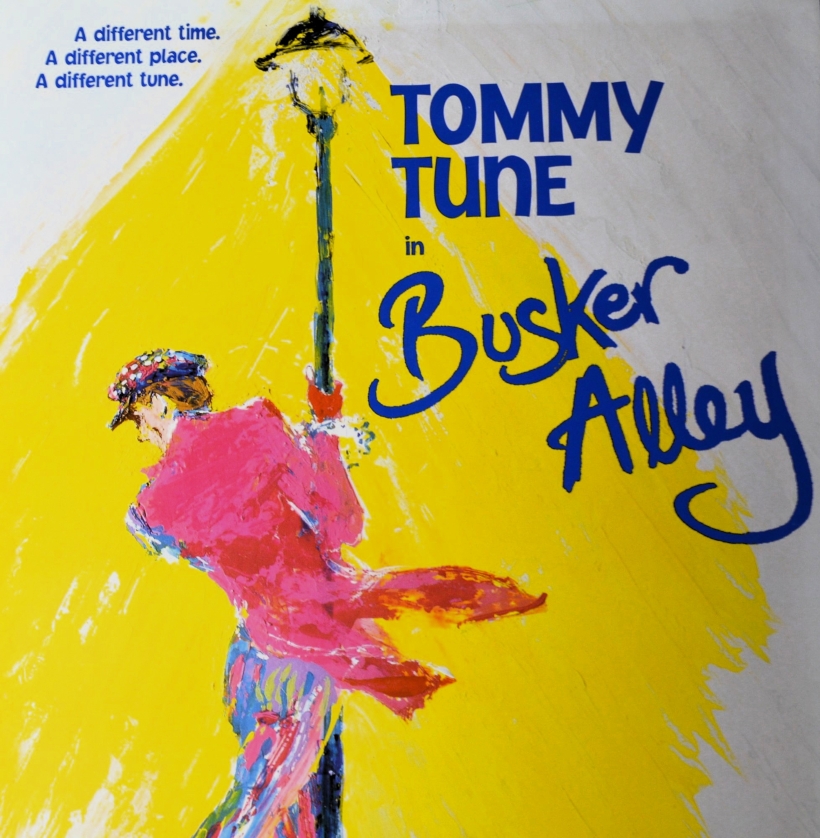
Surveying a collection of this magnitude takes time. Allred is early yet in the process, but already, compelling themes and stories are emerging from the materials. “What I can tell so far is that Tommy Tune is a Renaissance man of the theatre,” she said. “He sang, danced, acted, produced, directed, and choreographed shows on Broadway, off-Broadway, touring shows, and countless other productions. He was constantly working on something; often on several projects at once! I am a huge fan of musical theatre, so this is such an exciting opportunity. I know how important and inspirational Tommy Tune has been for so many aspiring performers in my own life; people from the South who looked up to him as someone like them who made it. I can’t wait to make this collection available and accessible to everyone.”
UH Libraries thanks Tommy Tune, Peter Glebo, and Gracey Tune for their incredible generosity and collaboration on this impactful gift. The Tommy Tune Collection’s journey to UH was facilitated by a collective effort. UH Libraries recognizes and thanks the following individuals for their integral role in bringing this collection to the University:
- Hillary Hart, executive director, Theatre Under The Stars (The TUTS Tommy Tune Awards event was held on Friday, June 6, honoring high school musical theatre in Houston.)
- Andrew Davis, PhD, dean, Kathrine G. McGovern College of the Arts
- Megan Topham, PhD, associate dean of operations, Kathrine G. McGovern College of the Arts
“The Tommy Tune Collection is a transformative addition to both our University Archives and our Visual and Performing Arts collections,” said Lauren Gottlieb-Miller, associate dean for special libraries and preservation. “This gift ensures that students, researchers, and artists for generations to come will have a direct connection to one of the great creative forces of American theatre. We are honored to steward Tommy Tune’s legacy in the city and University that helped shape him.”
This collection is being processed and is not yet available for viewing. For more information, contact Mary Manning.
View a Selection of Artists’ Books Donated by Dr. Roberto Tejada
By Allison Young, BA ’23/MA ’25
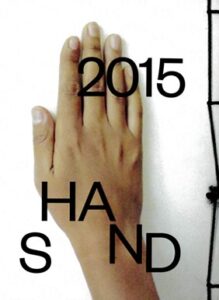
Hands, 2015 (2015) by Maria Chavez
Currently on display at Special Collections is a selection of artists’ books donated by UH faculty member Roberto Tejada. Tejada is a Hugh Roy and Lillie Cranz Cullen Distinguished Professor of English and Art History. He is a published author and award-winning poet, and received a Guggenheim Memorial Foundation fellowship in 2021. He also works as an art historian, cultural critic, editor, essayist, and translator. His research focuses on conceptual art and poetry—especially from Latin America and the U.S.-Mexico border—pertaining to language, identity, and the sociopolitical climate.
Artists’ books are a unique and expressive medium that explores the form and content of books. There is no “right” way to make an artist’s book, and this freedom is reflected in the diverse materials, design, binding, organization, and subject matter of these objects. These books are independently published as limited editions or created as one-of-a-kind originals and are artworks in their own right.
This exhibit features six books that showcase some of the variety found in this artistic practice. These books are a mix of independent projects, commissioned works, and/or collaborative pieces. Some are primarily text-based with essays relating to art, culture, and history, while others rely on art and photography to convey their messages. Each resource offers a unique approach to art, design, and literature. Three works are described here in greater detail: Erik Schmitt’s American Bauhaus (2022), Maria Chavez’s Hands, 2015 (2015), and Rubén Ortiz Torres’s MexiPunk (2021).
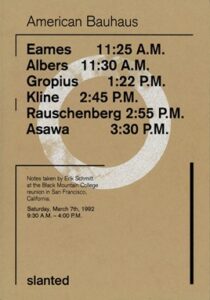
American Bauhaus (2022) by Erik Schmitt
American Bauhaus highlights the legacy of the Bauhaus art movement at North Carolina’s Black Mountain College. Originating in Germany, Bauhaus combined fine arts with craftsmanship and formed a radical new approach to design. American Bauhaus includes interviews, quotes, and photographs from the college’s reunion in 1992. Schmitt follows Bauhaus design principles with oversize text cutting across the page.
Hands, 2015 is a self-published and hand-bound artist’s book by Peruvian-Texan artist Maria Chavez. Hands contains photographs of the palms of different artists from a first-person perspective. Each pair of hands receives a full-page spread in the book. They are also captioned with the artist’s occupation and “how they use their hands” in their work. Chavez’s own hands, which she used to hand-bind her book, are featured on the cover.
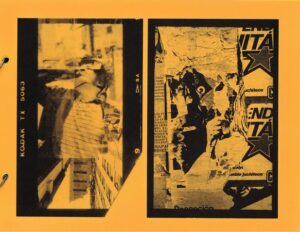
MexiPunk (2021) by Rubén Ortiz Torres
MexiPunk focuses on the niche significance of printing in Mexico City’s punk subculture during the 1970s and 1980s. Torres explains how photographs featuring punk artists and performers were printed, photocopied, and/or glued onto new paper as promotional flyers. Torres then follows this artistic practice by reprinting these photographs on bright, fluorescent cardstock. Mariano Villalobo’s 2020 poem “Carnicopatas Intramusculares” (or “Intramuscular Fleshophrenics”) is featured at the beginning of this artist’s book, accompanied by an English translation by Tejada.
Library Excellence Awards 2025
University of Houston Libraries honored outstanding employees at the 2025 Library Excellence Awards this week. Now in its 25th year, the event, held at the MD Anderson Library Elizabeth D. Rockwell Pavilion, recognizes the special work and talent of UH librarians and staff. The annual tradition is supported through the generosity of the John P. McGovern Foundation.
Interim dean Christina Gola opened the garden party-themed celebration with gratitude for the many individuals who helped produce the awards event, including all nominators, members of the awards committee, members of the employee engagement committee, and facilities staff. Libraries student employees who won scholarships for the upcoming academic year were also acknowledged.
The Dean’s Advocate Award went to Terri Batiste of UH Human Resources. This award recognizes a UH employee from outside UH Libraries who has worked closely with the Libraries during the past year. Batiste collaborated with the Libraries Organizational Development team to provide invaluable assistance with specialized leave scenarios, including Family Medical Leave requests and authorizations. Her dedication ensures that requestors, the Organizational Development team, and supervisors understand the complex FML process and navigate it with ease.
The Student Achievement awards were presented to Rebecca Fox and Chelsea Dzu, two Coogs whose superior performance demonstrates their commitment to carrying out the Libraries’ mission for UH. Fox is recognized for her exceptional job performance and skill set. Her keen judgment and problem-solving abilities have earned the trust of her supervisors, who have asked her to take on progressive responsibilities as a student lead.
Dzu is described as an exemplary employee in the William R. Jenkins Architecture, Design, and Art Library. She is a self-starter who is curious by nature and has a positive impact on others. She took the lead in creating a workgroup chat for student employees for updates and to ensure coverage at Jenkins Library.
This year’s McGovern Outstanding Student is May Le, who is described as dedicated, meticulous, and extremely dependable. She has been crucial to the success of the Jenkins Library, taking on key service and operational responsibilities after unexpected vacancies. Her expertise with systems such as WorldCat, Iliad, and the Avery Index has been a valuable resource.
Julia Dion is the McGovern Staff Rookie of the Year. Dion quickly became an integral part of the Special Collections team, making what can be a hectic department run smoothly. In addition to managing the reading room calendar, coordinating supply orders, and making the effort to give student workers quality learning opportunities, Dion leverages previous archives experience in training students on processing and serves as the point of contact for inquiries received via Archives Space and Texas Archival Resources Online.
The McGovern Librarian Rookie of the Year is Katy Allred. Previously, she was a processing archivist in Special Collections, and in her current role as assistant university archivist, Allred processes UH archival materials that have been prioritized for the upcoming Centennial. She is a trusted, supportive colleague who is known for her calm professionalism and great attention to detail, and is not intimidated by difficult projects.
Eric Larsen and Frederick Young received Staff Achievement awards. Larsen’s performance has been particularly meritorious over the past year in the Music Library. After the departure of the manager, he assumed oversight of the student leaders and managed successful continuity of services to the academic programs supported by the Music Library. Larsen brings a high level of excellence to his role, seeking opportunities to learn, grow, and contribute, and providing wisdom and enthusiasm to the incoming colleagues and managers during the onboarding process.
Young is recognized for his expertise, strong relationship-building skills, and thoughtful approach to his work. Over the past year he has leveraged these strengths to achieve positive outcomes for UH and other university libraries. As leader of the UH Alma Stakeholders committee, he coordinated efforts to develop a sustainable infrastructure for shared governance of the library services platform and worked with Ex Libris to implement Alma Primo VE enhancements to improve the user experience.
The McGovern Outstanding Staff awardee, Lakeshia Clark, has made high-impact contributions to Information and Access Services. After expertly managing the course reserves and faculty delivery services for several years, she accepted the role of service desk manager during a time of departmental transition, becoming familiar with policies and processes while assuming new responsibilities over student hiring, training, and supervision. In addition to her new role, she continued to manage the course reserves and faculty delivery services as she worked closely with colleagues to transition these services to other areas.
Wenli Gao and Mea Warren were honored for Librarian Achievement. Gao has continued to build a national reputation in scholarship and service while leading several key initiatives for the Libraries. She is effective at collaborating with colleagues with a work style that is efficient and inclusive. In 2024 she led a holistic evaluation of Libraries collections, the implementation of Article Galaxy Scholar, a new article-on-demand service, and the Circulating Print Collections Assessment (CPCA) project. Last year, Gao was awarded the Distinguished Service Award from CALA, the Chinese American Library Association, an organization for which she is currently serving on the Board of Directors.
Warren became interim head of Teaching and Learning in 2024. She was elected to the Association of College and Research Libraries (ACRL) University Libraries Section Executive Board and appointed to its nominating committee. She was also appointed to the National Survey of Student Engagement (NSSE) Information Literacy Module Review Task Force. At UH, she is a faculty senator and member of the Graduate & Professional Studies Committee of the Faculty Senate. She chaired the Libraries’ Promotion Committee during a busy year and served on the inaugural Librarian Annual Performance Review Peer Review Committee.
Madelyn Washington is the McGovern Outstanding Librarian, with impressive 2024 accomplishments. She demonstrated dependability, priority-setting, and leadership in managing operations of the Music Library while taking on a new leadership role as the head of Information and Access Services. She was also promoted to the rank of associate librarian, having achieved excellence in scholarship and service to the profession.
This year’s Outstanding Group is the Resource Management Unit, Tim McGittigan and Jennifer Unruh. A nominator stated this unit “worked magic this year” as new employees in resource management, where they created a triage system for handling a significant backlog of unprocessed gift books, unbound serials, and uncatalogued unique items. Their efforts nearly eliminated the entire backlog in just a year, resulting in making materials discoverable and available for students and scholars.
The Trailblazer Award for Leading Organizational Change went to collaborators Maurine Nichols and Devianee Vasanjee, who led the development of new licensing and procurement workflows within a tight timeframe. While one surfaced opportunities for drastic improvement of workflows to align with UH administrative priorities, the other demonstrated diligence and creativity in understanding and interpreting university policies and finding solutions reflecting the unique needs of acquiring library materials. Both developed new relationships on campus, leveraged the strengths of their talented teams to accomplish this work, and built a positive reputation for Libraries compliance and collaboration.
Members of the Library Excellence Awards Committee are Jamie Duke, Julie Grob (chair), Jennifer Holland, Susan Hoover, Natalia Kapacinskas, Eric Larsen, Yesenia Umana, and Santi Thompson, (ex officio).
